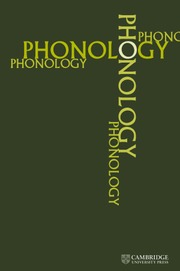Article contents
Licence to govern*
Published online by Cambridge University Press: 20 October 2008
Extract
In this paper I consider the behaviour of word-internal empty nuclei preceded by a consonant cluster. I provide a principled account for the fact that in this context a properly governable empty nucleus receives a phonetic interpretation. To do so I introduce a new notion: GOVERNMENT-LICENSING. I argue that a non-nuclear head can govern a complement only if (i) it has the required charm value, or if charmless, the required complexity, and (ii) it is licensed to govern by a following nuclear head. Among other things government-licensing accounts for the phonetic realisation of an empty nucleus following a governing onset head (i.e. a non-nuclear skeletal point which governs a rhymal or an onset complement), and for the simplification of a consonant cluster preceding an unrealised empty nucleus. If, in order to govern a complement, a nonnuclear point must be government-licensed and if a properly governed empty nucleus may not be such a licenser, in a situation where a properly governable empty nucleus follows a consonant cluster we predict the two following possibilities: to license the consonant to govern, the empty nucleus will fail to be properly governed, or proper government will apply, preventing the non-nuclear head from governing its complement, which entails the loss of this head.
- Type
- Phonological government
- Information
- Copyright
- Copyright © Cambridge University Press 1990
References
REFERENCES
- 38
- Cited by


